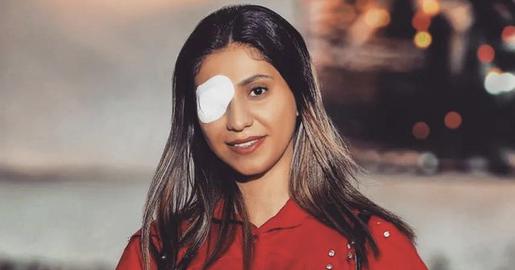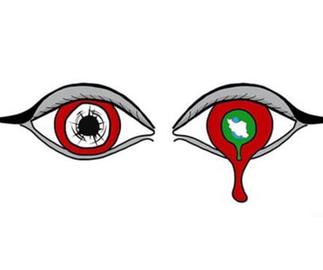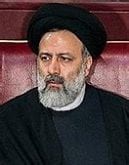Iranwire – As the protests raged on, an Islamic Republic riot squad officer smirked at Kowsar Eftekhari. Moments later, he targeted her eye with pellets from his gun, and blinded her in one eye.

A year and a half since the start of the Woman, Life, Freedom movement, her name resonates in the array of people who have suffered human rights abuses in Iran.
The 25-year-old Iranian woman never envisaged finding herself a refugee in a foreign country.
When I talked with Eftekhari for the first time, the systematic targeting of protesters’ eyes by the Islamic Republic had not yet fully come to light.
Eftekhari had still only recently lost her eye. Victims were yet to find each other and a sense of solidarity and their voices remained unheard.
Over the past year, I have stayed in touch with her, watching her progress and life, but our most recent meeting in Berlin, Germany, was the first time we have met in person.
Together, we retraced her journey: from her upbringing in the city of Mamaqan to pursuing education far from her family.
From her involvement in the Mahsa Amini movement, to the loss of her sight in one eye, and delivering remarks at the United Nations in Geneva following the presentation of the fact-finding mission’s report and its determination that the Islamic Republic had committed crimes against humanity.
Kowsar was born in Mamaqan 23 years after the 1979 Islamic Revolution.
She belongs to a generation that, despite the Islamic Republic’s stringent regulations, tried to lead a normal life, like young individuals in most parts of the world.
In her own words, “When I was growing up in Mamaqan, I was forced to wear a chador, I never chose to wear a chador.”
“In a way,” she adds, “I broke the social taboos of Mamaqan. Basically, I stood up to my dad, and his worries about me attending university.”
“I’ve always hated the mandatory hijab,” she says, “both in and out of university. It felt like I was being humiliated for being a woman.”
This same question of “Why?” echoed in the minds of millions of Iranian women, who cried out Woman, Life, Freedom, on September 16, 2022, following the death in custody of Mahsa Amini.
Kowsar’s defiance extended beyond just the mandatory hijab. She also challenged her father’s concerns over her pursuing university education away from her family.
She departed from her hometown and ventured alone to another city for her studies, enrolling at Al-Zahra University in the capital Tehran.
However, amidst this solitude, Kowsar was detained for participating in the protests of 2022.
During six days of imprisonment, she experienced the depths of violence and cruelty perpetrated by the Islamic Republic.
It is an ordeal that still haunts her at times, an experience fraught with sexual harassment and humiliation.
“The jails are full of political prisoners,” Kowsar says. “I was there only six days, but I saw many others who had been there over a year and I know they are continuously tortured. I was there just six days, I was tortured for [just] six days, and still feel the pain.”
“We were subjected to cavity searches three times a day, just to humiliate us. It seemed they tormented us on purpose,” she adds. “They forcefully checked inside our underwear. They humiliated us with this torture several times a day. We had already been searched and had nothing, and we were always under observation. They constantly interrogated and beat us. This was just to abuse and belittle us, so even after we were released, we would remain hopeless and helpless and never dare protest again.”
“I constantly think about it, and those thoughts still make me cry. That’s how horrible those days were. They treated us ruthlessly, even though we were innocent,” Kowsar says.
According to official statistics from the Islamic Republic, tens of thousands of individuals were arrested during the nationwide protests of 2022.
Despite the traumatic experience of being arrested by the forces of the Islamic Republic, Kowsar courageously joined the nationwide protests in 2022.
It was 12:30 pm on October 12, 2022, when people began to gather, yet no slogans had been chanted.
Women had bravely removed their hijabs, prompting special unit officers to beat them with batons, and to sporadically fire shots into the air. Kowsar’s heart raced with fear.
“I was on Valiasr Street, around noon,” she says. “There was a silent crowd. The only political aspect was that women were showing their hair. The special forces were using batons to beat women not wearing scarves. Then they fired machine guns in the air to terrorize the crowd and cause panic.”
“My heart was bearing 1,000 times a minute,” Kowsar adds. “I understood my fear was because of the special forces, so I decided to stop, and confront my fear and walk through the line of armed special forces who stood against this silent crowd. I told myself I’d walk through and that nothing would happen to me for not wearing my scarf.”
But then: “I began walking through them, and suddenly, one of the guards pushed me from behind and I went flying forward. I spun around and said, ‘What gives you the right to push me?’ … More guards came over. They started cursing and insulting me. A plainclothes agent with them approached me, he was one meter from me. He started shooting me with paintballs and he shouted at me, as loud as he could, ‘Leave! Or I’ll shoot your eye out!’ He repeated this over and over.”
Kowsar tried to run away, but fell, and from the ground she saw two riot police officers dragging two women by their headscarves, strangling both of them “as if they weren’t human beings,” she says.
“I told them to stop,” Kowsar says, “I was lying on the ground, it was right after being shot by paintballs. … The man who threatened to shoot my eye appeared again. He smirked, aimed at my face, and shot me in the eye.”
As she recounted this harrowing chapter of her life in front of our camera, she removed the eye patch from her injured eye, revealing the cruel consequence of the Islamic Republic’s brutal crackdown.
“My eye has been like this for a year, thanks to the Islamic Republic” Kowsar says, almost in tears. “I used to have another beautiful healthy eye … It had vision, it worked perfectly, but he simply smirked and shot at my eye. I’m sure he’s seen me on social media. How does he feel about this eye?”
“How can an Islamic Republic agent obey such an order? … I might have only one eye now but I can still fight against the Islamic Republic,” she adds.
Kowsar was rushed to the hospital – her eye throbbing with pain and burning with an unbearable itch.
The doctors cautioned her against touching her eye and notified her father. Upon hearing the news of Kowsar’s eye being shot, her father’s jaw locked for 30 minutes; he was in shock.
Kowsar’s mother struggled to believe the grim reality until the medical staff painstakingly explained the situation.
Despite administering morphine and painkillers, Kowsar writhed on the hospital bed, in excruciating pain and nervous tension. “I kept hitting my bed out of frustration,” she says, “and I began doubting if there was a god. How could anyone shoot out an eye on purpose? Why was that man smirking?”
Fear gripped Kowsar as she fretted over the potential loss of her eyesight and even her looks.
In her own words, she experienced a state of “strange helplessness,” which began to subside only when her father came from to Tehran.
“It was a horrible night. I felt as if I had been abandoned. What will happen to my eye? What will they do to me if I am arrested?” Kowsar says.
And then it seemed that detaining, torturing and blinding Kowsar was not enough; her spirit and mental health needed more abuse.
Like many other injured individuals, Kowsar was coerced into visiting a mental hospital for “evaluation.”
Admitted to hospital, Kowsar found compassion from many doctors and nurses, who shed tears for her plight. But there were others whom Kowsar felt were devoid of humanity. She was later sent to a mental institution for evaluation by psychiatric doctors.
“There were some horrible doctors there, who weren’t as empathetic as the others,” Kowsar says. “While I was sitting in the basement waiting room of that asylum, for over two hours, I heard the screams of the mental patients there and I myself was in a terrible state.”
“They put me in a room with two psychiatrists. They were the most disgusting doctors I have ever seen. They were inhumane. How could they be so vile, and treat me so badly? Just to gain the favor of the Islamic Republic?” she says.
“They suddenly asked me if I had suicidal thoughts. I asked, why should I? ‘Did you never once consider suicide, before the blinding?’ I told them I had never contemplated suicide. Then they asked about my parents. ‘Have they ever thought about suicide? Have they ever attempted it?’ … I could tell they were looking for an excuse to lock me up in a place where I kept hearing horrible screams.”
Theater and acting had always been integral to Kowsar’s life. After losing vision in her right eye, the theater stage became her sanctuary.
But the Islamic Republic swiftly banned Kowsar from performing in several theaters and even barred her from continuing her studies.
She was on the cusp of obtaining her degree in Arabic literature from the university – only to have it snatched away.
“The same night I was blinded,” Kowsar says, “I phoned one of my theater friends and told her I had had so many hopes and creams, but they took them all away from me. My friend told me that I should not give up on theater. I could succeed if I stayed strong, and didn’t give up. They broke me that night, but I was able to get back up.”
Connecting with others who shared similar experiences – of sustaining brutal eye injuries after participating in peaceful protests, at the hands of the Islamic Republic – provided solace and solidarity. Kowsar she learned from them how to persist in the face of her daily suffering.
But pressure from the Islamic Republic intensified after a group photo of blinded individuals attending Kowsar’s theater performance circulated on social media.
Messages and phone calls flooded in, alongside subpoenas, and even threats of acid attacks.
“After the photo of me at the theater went viral, the authorities pushed for charges to be brought against me,” Kowsar says. “That was when they began threatening to throw acid in my face. Appearing on stage definitely upset them and I was officially blacklisted from working. My hard-earned degree was revoked. I was banned from any kind of studying. They were trying to humiliate me by denying me success, forcing me to be a failure.”
“I was forced by all the pressures they put on me to leave everything behind and move to a strange land, but with the hope that I will continue the struggle, and stand against this regime in my own way and not shame myself before the people of Iran,” Kowsar adds.
Judge Iman Afshari sentenced Kowsar to prison, aiming to stifle her online activities as well.
The verdict included four years and three months of penal servitude, with five months immediately enforceable. Any deviation, such as posting a photo without explanation, would result in the full sentence being executed.
Kowsar was also barred from using a smartphone, communicating with the media and social media, or leaving Iran, effectively limiting her life to basic necessities.
Despite leaving Iran, Kowsar remains committed to continuing the struggle, lending her voice to the people and those exiled from their homeland.
And as the Islamic Republic denies any wrongdoing against protesters on the international stage, thousands of victims bear witness to the atrocities abroad.
The United Nations fact-finding mission’s report states that protesters’ eyes were systematically targeted, constituting a crime against humanity.
 Shabtabnews In this dark night, I have lost my way – Arise from a corner, oh you the star of guidance.
Shabtabnews In this dark night, I have lost my way – Arise from a corner, oh you the star of guidance.



